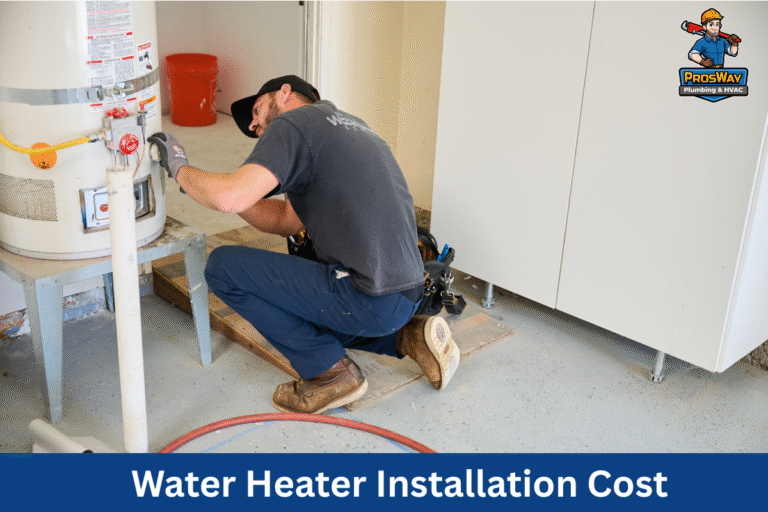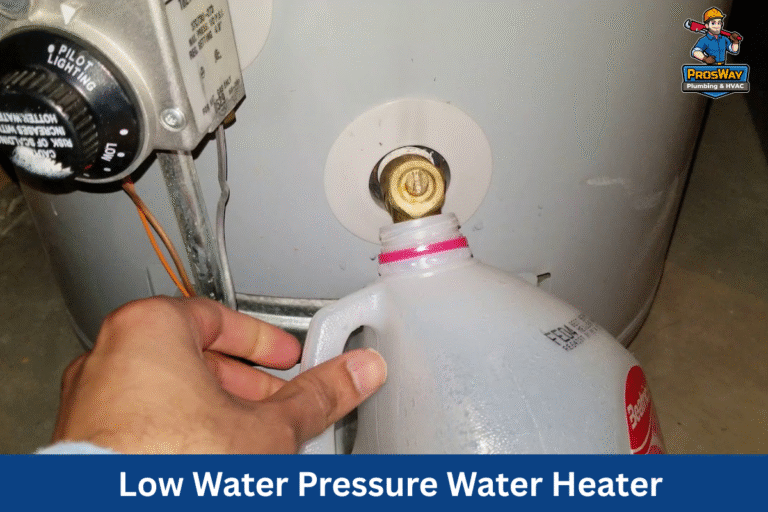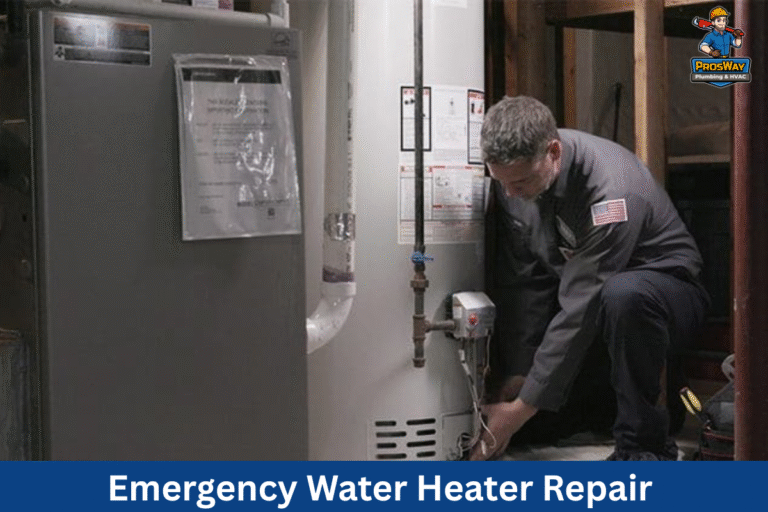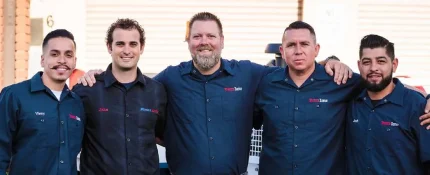It’s not unusual for the water heater to produce a couple of noises when it’s operating. However, hearing your water heater making strange noises can be unsettling. For many homeowners, sounds like popping, banging, or hissing raise immediate concern about safety or looming breakdowns.
The truth is, noises can signal anything from harmless mineral movement to serious plumbing problems. A grasp of what those sounds mean helps you act quickly and avoid costly damage. This guide covers the most common noises, what causes them, safe troubleshooting steps, and when it’s time to bring in a professional plumber.
Common Types of Water Heater Noises (What You Might Hear)
Popping / Banging
A popping or banging noise is one of the most frequent complaints from homeowners. This sound comes from sediment buildup at the bottom of the water heater tank. Minerals like calcium and magnesium settle and form a hard layer.
As water heats beneath the sediment, steam bubbles get trapped and burst suddenly, causing loud pops. Over time, this makes the noise worse, reduces energy efficiency, and stresses the tank lining.
Rumbling
A deep rumbling noise indicates that heated water is pushing its way through a thick layer of sediment or limescale deposits. In areas with hard water, the problem accelerates without a water softener.
Rumbling often means your heater is working harder than it should, which shortens its lifespan and increases energy bills.
Hissing / Sizzling
Hissing or sizzling sounds occur when water leaks onto hot components. For gas water heaters, dripping onto the burner produces this noise. For electric water heaters, water contacting the lower heating element has the same effect.
Common sources include a loose T&P valve, a seeping drain valve, or even cracks in the tank. Persistent hissing almost always points to a leak that needs fixing.
Ticking / Tapping
Ticking is usually harmless but annoying. As metal parts expand and contract from heat, they make light tapping noises. Pipes that run through walls can amplify this. Sometimes it’s just loose pipe straps or poorly aligned valves letting the pipes move more than they should. Insulating or re-strapping the pipes often quiets the problem.
Screeching / Whistling
This high-pitched noise usually means restricted water flow. It can happen when an inlet valve is only partially open, or when a heat trap nipple is stuck. Another cause is a faulty pressure-reducing valve that isn’t regulating flow correctly.
Screeching sounds are not just irritating; they often point to a problem affecting water pressure and safety.
Why Do These Noises Happen? (Underlying Causes)

Sediment Buildup
Minerals in hard water sink to the bottom of the water heater tank. Over time, they harden into a thick crust. When water is heated beneath this layer, steam bubbles form and explode, causing popping or rumbling. Sediment also insulates the water from the burner or heating element, forcing the system to run hotter and longer.
Scale on Heating Elements
In electric water heaters, the lower heating element often becomes encased in scale from minerals. This buildup causes the element to overheat, producing sizzling and crackling sounds. Left unchecked, it can burn out the element prematurely and reduce hot water availability.
High Water Pressure
Household plumbing pressure that exceeds 80 psi stresses the discharge pipe, valves, and joints. Excess pressure makes whistling or screeching sounds and forces the T&P valve to release water. Installing or adjusting a pressure-reducing valve keeps the supply in the safe 50–60 psi range.
Loose or Expanding Pipes
As hot water flows through, pipes expand slightly. Ticking sounds result when they rub against wood framing or metal. Missing pipe straps, inadequate insulation, or poor installation make it worse. While not dangerous, it’s a common nuisance in older homes.
Leaks or Drips
A constant hiss often means water is dripping onto hot surfaces like the burner in a gas model or the heating element in an electric one.
The drain valve, T&P valve, or corroded seams are typical sources. These leaks need quick attention to prevent water damage or electrical hazards.
Aging System
As a gas or electric water heater ages, corrosion spreads. A weakened anode rod no longer protects the tank, leading to rust.
Older heaters often make more noise simply because of failing parts, worn insulation, or tank corrosion. A unit over 10 years old that gets noisy usually signals it’s time for replacement.
Quick Troubleshooting Steps For Homeowners
Some checks are simple and safe enough for homeowners to attempt. These steps help confirm if the problem is minor or requires a licensed plumber.
- Check water pressure: Attach a gauge to a faucet. Household pressure should read between 50–60 psi. Consistently high readings strain the heater and cause noisy valves.
- Flush the tank: Use the drain valve and a garden hose to release sediment from the bottom of the tank. This is especially important in hard water regions where calcium and magnesium build up faster.
- Inspect valves: Ensure the inlet and outlet valves are fully open. A half-closed valve restricts flow and causes screeching. Also, check the T&P relief valve and drain valve for small leaks.
- Listen near the pipes: Ticking often comes from plumbing lines rubbing against wood framing. Adding pipe straps or insulation can quiet the noise.
- Shut down the heater: When noises sound severe, like loud banging, screeching, or sizzling near a suspected leak, turn the unit off at the breaker (electric) or gas valve (gas) and call for help.
When to call a professional?
Persistent noises in a water heater often point to issues that go beyond simple homeowner fixes. The steps mentioned above may quiet common noises.
But continuous or worsening sounds almost always need professional diagnosis. The majority of water heater issues must be addressed solely by a trained professional.
How to Avoid Future Water Heater Noises?

Prevention is always cheaper than emergency repair. A few regular steps keep water heaters quieter and more efficient.
- Annual tank flushing clears out sediment, scale, and mineral buildup before they harden.
- Install a water softener in hard water areas. Reducing calcium and magnesium in the supply water prevents scale on heating elements and rumbling tanks.
- Regular valve checks on the T&P relief valve and inlet/outlet valves ensure they open and close properly, avoiding screeching sounds.
- Inspect the anode rod every 2–3 years. Replacing a corroded rod prevents tank rust and the noisy byproducts of internal corrosion.
- Pipe insulation and straps reduce ticking and hammering in water lines caused by thermal expansion.
- Annual professional inspection gives you peace of mind. A plumber can detect small leaks, faulty thermostats, or clogged vent lines before they become major failures.
Conclusion
A water heater making strange noises is more than an annoyance. Each sound, even if popping, rumbling, hissing, or screeching, points to a condition inside your system. Some, like light ticking, may be harmless. Others, such as whistling from a pressure issue or hissing from a leak, signal problems that should never be ignored.
Stop the Noise With Expert Help!
Strange sounds from your water heater are a warning, not a mystery. ProsWay Plumbing & HVAC’s licensed technicians in Northern New Jersey handle everything from sediment flushing to valve replacement and full system upgrades. Call us now at (862) 260-5870 or Book Online today for professional water heater service and peace of mind that the noises won’t come back.








